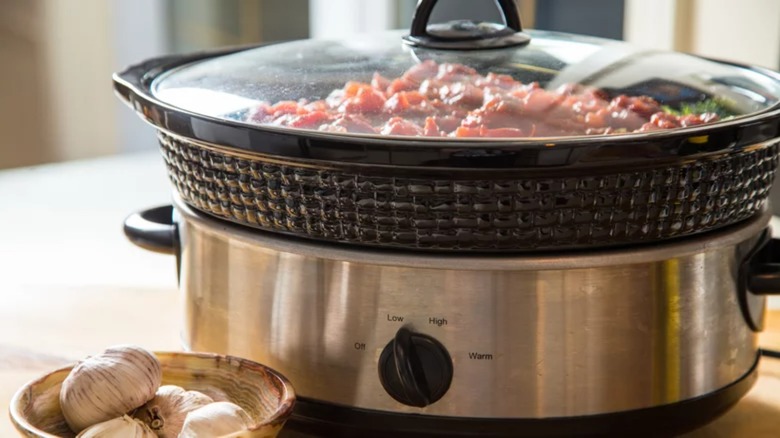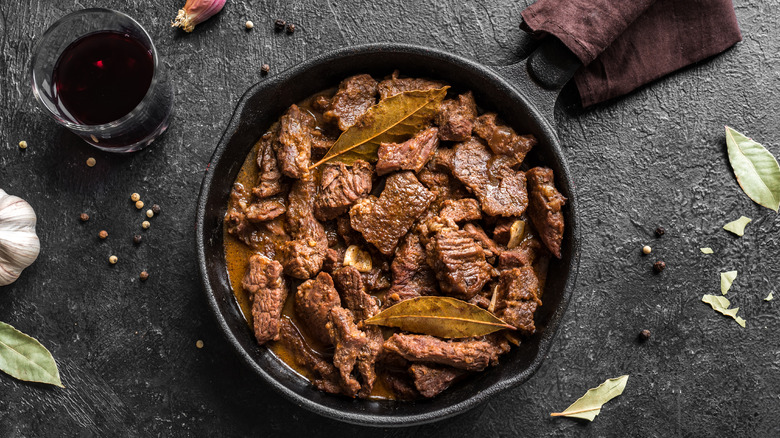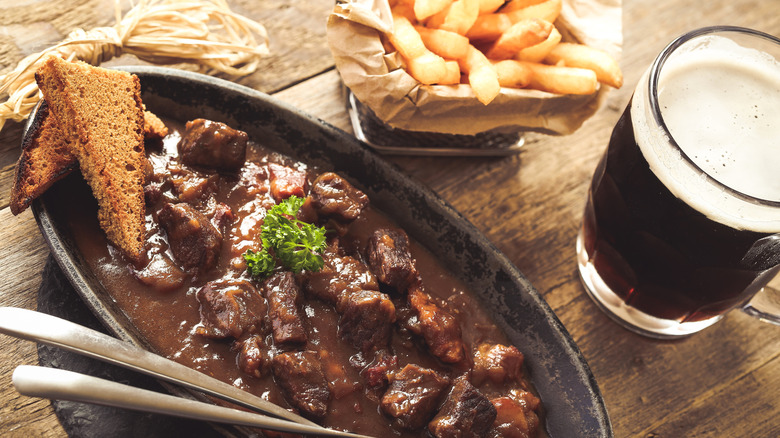How Alcohol Can Affect Your Slow Cooker Meals
Of all of our favorite kitchen appliances, the slow cooker trends toward the top of the list. Since the first version of this handy tool came to the American market in the 1950s (via CNET), it's become a common presence in many home kitchens, helping to prepare fruity al pastor pork, eggy, cheesy breakfast casserole, and hearty split pea soup, to name just a few dishes. The slow cooker is a surprising winner for unexpected uses, such as making large portions of creamy oatmeal or rice congee and serving warm mulled wine and cider during holiday dinner parties and cookie swaps, too.
Although the Instant Pot is most likely the popular hands-off appliance most of us think of first, slow cookers are no slouch: According to Food & Wine, they're found in more than 80 percent of American homes. And though they're great for cooking a huge variety of dishes, it might be best to avoid slow cooking any recipes which call for a substantial amount of alcohol.
Most alcohol in recipes cooks off
For those of us that like to cook, it's more than likely that we've prepared a dish that calls for some form of alcohol: think of coq au vin, a French dish of chicken braised in wine; boeuf bourguignon, also a French stew featuring wine and, in this case, beef; and vodka sauce, the creamy tomato sauce spiked with vodka that's often tossed with penne pasta. While all of these dishes feature quantities of alcohol ranging from miniscule to generous, they have something else in common, too: At least a little bit — and possibly a lot — of the alcohol used in the dish will "burn off" as it cooks.
According to Food Network, foods cooked with alcohol (or baked, such as a rum cake) will have less alcohol content at the end of cooking. In their example, a pot roast made with wine and roasted for more than two hours retains only five percent of the original quantity of alcohol, though dishes with more alcohol and a shorter cook time will retain more. But here's the thing: Many of the dishes we prepare with alcohol are made in a pot or baking dish that's uncovered for at least part of the cooking process, allowing the alcohol to evaporate.
But a sealed slow cooker doesn't give the alcohol the opportunity to burn off
As noted by Kitchn, that's not the case with a slow cooker, which is covered with a lid during its long cook times in order to slowly steam and braise the food. So any alcohol you add to a slow cooker recipe might not get hot enough — or exposed to enough air — to reduce in volume.
Although you're not likely to get tipsy from any alcohol-spiked slow cooker dishes, the strong, "raw" flavor booze has when it's not cooked out isn't likely to mesh well with the dish you're making. So what to do if your slow cooker recipe calls for it? Kitchn advises browning any meat used in the dish first, then using the alcohol called for to deglaze the pan before transferring the contents to the slow cooker and proceeding with the recipe. If the recipe was designed specifically for a slow cooker, just use the amount of alcohol called for and no more: Instead, you can pour yourself a glass to enjoy with the finished dish.


